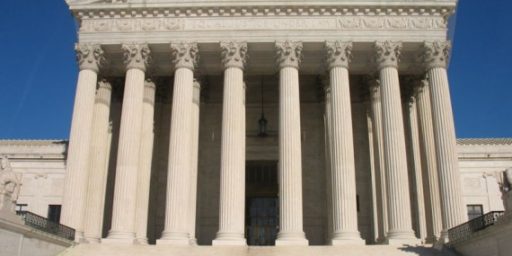Affordable Care Act Ruled Constitutional
The Affordable Care Act has been ruled Constitutional in Holder v. Mead.

Judge Gladys Kessler of the D.C. Circuit Court has ruled that the Affordable Care Act does not violate the Constitution. The full opinion is here, but I haven’t had a chance to read it.
For the record, most of the Constitional challenges have been thrown out of Court. Where there’s been a substantial ruling, three judges have found the ACA Constitutional, two have found it unconstitutional.
For my own part, I think the individual mandate is clearly within the Constitutional authority to regulate commerce, and that the rulings in its favor are much more in line with Commerce Clause jurisprudence since the days of John Marshall than those rulings against. The rulings against the ACA have, in my mind, been more in line with the Court’s radical departure from traditional Commerce Clause jurisprudence in 1905’s Lochner v. New York decision, a line of jurisprudence that lasted less than 30 years before the Court returned to the Supreme Court’s original Commerce Clause jurisprudence during the New Deal era.
I have predicted in the past, and I stand by this prediction, that if a Constitutional challenge even makes it to the Supreme Court, the ACA will be upheld as Constitutional on an 8-1 vote, with only Thomas dissenting.






A Democrat judge in a Democrat district….big surprise here. Like Scalia and Roberts is going to uphold this?….what utter nonsense. I suggest you pull your head out of your ass.
I beg to differ. Scalia’s opinion in Raich v. Gonzales makes it quite clear that he has accepted that the Commerce Clause is far-reaching.
So was the pensicola decision striking it down not news either (A Republican judge in a Republican district)?
Are you also suggesting that supreme court justices decide along party lines?
Of course a judge striking it down is proof that it's evil. A judge upholding it is judicial activism. Or tyranny.
If teabaggers wonder why people laugh at their claims of love for the constitution, this is pretty much why.
I love the triumphalism in this post, Alex. Hilarious!
Interesting how Michael just automatically assumes Scalia and Roberts will make an entirely political decision without regard to legal precedent or statute law. Next he'll be screaming about liberal legal activism.
The author must have gone to law school. It really muddles the brain. They learn that if tyrany is the precedent, tyranny must be consistent with the constitution.
I dont care what lawyers and judges say, government can’t make me buy a thing and call it consistent with the constitutional republic envisioned by the founders. How do I toss that health care mandate into the harbor?
I guess I missed the memo where John Marshall and Alexander Hamilton were kicking out of the Founding Fathers club.
"Judge Gladys Kessler of the D.C. Circuit Court has ruled that the Affordable Care Act does not violate the Constitution. The full opinion is here, but I haven’t had a chance to read it."
Do you think it is relevant whether this Judge is Dem or Repub? And if so, do you believe you should let your readers know so they can make up their own mind. Of course, if you're hiving up the Liberal party line, I guess it doesn't matter to you if the Judge is pushing a Lib agenda.
I'm not saying the Judge is right or wrong; I'm just suggesting that you often omit relevant info from your posts that fully informs readers of the merits of your argument. It's like when you quote polls with negative results for Repubs from PPP without alerting your readers that PPP is sponsored by DailyKOS.
The political science research on judicial behavior pretty clearly shows that the Justice's partisanship is a major determinant of decision-making.
If there wasn't valid reasoning and/or precedent on both sides of a case, it probably wouldn't make it to the Supreme Court. Republican Justices tend to decide for the party suggested by conservative jurisprudence, and vice versa for Democratic Justices.
@Michael
" Like Scalia and Roberts is going to uphold this?"
Michael, to understand why those two might not be the slam dunks you think, see Gonzales v. Raich, Scalia concurrence; and see, Kerr, Predicting How the Mandate Might Fare at the Supreme Court: Explaining Chief Justice Roberts’ Vote — and Opinion Assignment — in United States v. Comstock.
@Efbandy
"I dont care what lawyers and judges say, government can’t make me buy a thing and call it consistent with the constitutional republic envisioned by the founders."
See, Militia Act of 1792
>I have predicted in the past, and I stand by this prediction, that if a Constitutional challenge even makes it to the Supreme Court, the ACA will be upheld as Constitutional on an 8-1 vote, with only Thomas dissenting.
What was your prediction for Bush v. Gore?
Efbandy says:
Wednesday, February 23, 2011 at 11:55
The author must have gone to law school. It really muddles the brain.
I can see it must be a problem for you
"The political science research on judicial behavior pretty clearly shows that the Justice's partisanship is a major determinant of decision-making."
This doesn't make it right or even true in every case. It was the automatic assumption of conservative legal activism by a group that constantly decries legal activism.
@Smooth Jazz
"Do you think it is relevant whether this Judge is Dem or Repub? And if so, do you believe you should let your readers know so they can make up their own mind. "
To the first, not really — that the judge may or may not be a Dem (or a Repub) ought not to count anymore than the fact the Virginia and Florida judges are Republicans: the arguments of the opinions are what matters. As to the second, well, you could always go read the opinion and make up your own mind.
From what I know of the commerce clause it's going to be very difficult to reject it even for conservative justices. My son whose a fairly conservative lawyer thought the opinion by the judge down in Florida was a travesty. He'd have been ashamed to write it when he was a law clerk , but guess what, some lawyers don't have a lot of integrity even when they are on the bench.
Boy, this thread is a teabagger goldmine. Now we have someone who loves the constitution so much he refuses to let those authorities given power to interpret it by the constitution tell him what it means. He is the only one who gets to decide whether or not a law is constitutional.
Kylopod –
Didn’t have one at the time. Those were my college Libertarian days and I was busy talking about how the whole situation meant that a libertarian alternative was needed, etc etc etc.
Do you think it is relevant whether this Judge is Dem or Repub? And if so, do you believe you should let your readers know so they can make up their own mind. Of course, if you're hiving up the Liberal party line, I guess it doesn't matter to you if the Judge is pushing a Lib agenda.
Hey Kenny G, I notice you didn't care that when Doug posted about Judge Vinson ruling the PPACA unconstitutional, he didn't mention Vinson was appointed by a Republican. Why is that? Why do you insist that judges appointed by Democrats be identified as such, but not Republicans? Hmm.
This challenge was based upon the act violating the freedom of religion under a specific law (Religious Freedom Restoration Act of 1993) and the judge disagreed. This is not some overall judgment of the health care act on constitutional grounds but a very narrow ruling. It's hardly a victory for those in favor of Obamacare. The issues brought before the court matter as much as the win-loss tally. This one had nothing to with commerce clause or the Constitution.
The challenge was based on TWO claims – "whether [section] 1501 passes muster under the Constitution of the United States , and whether it violates the Religious Freedom Restoration Act of 1993" (p. 3 of decision).
The judge rejected both challenges.
Steven,
From the opinion:
So while the argument under RFRA was made, it was the alternative to Plaintiff’s primary argument that the mandate is unconstiutional.
The Judge in this case upheald the mandate as a valid exercise of the Commerce Clause.
@Alex
Few people predicted Bush v. Gore would turn out so egregiously partisan. It was such a terrible decision that many conservatives at the time criticized it. Richard Posner wrote an entire book in which he argued essentially that the Court's reasoning was legally indefensible but that the decision was nonetheless necessary. But none of that mattered in the long run. Bush entered office, the questions about his rise to power were quickly swept under the rug, and he went on to appoint one of the biggest judicial activists in the Court's history as Chief Justice.
The Court has never been totally separated from partisan politics–we all remember the fights with FDR–but Bush v. Gore represented the complete and absolute breakdown of the pretense that the Court was anything but a partisan body. With Scalia and Thomas attending seminars sponsored by the Koch brothers, that becomes increasingly clear.
So all your arguments about trying to guage how the justices will vote based on their past rulings on the Commerce Clause are probably moot. Who cares about precedent? It didn't matter in 2000. This is not some academic debate. Destroying Obamacare–and in turn, destroying Obama's presidency–has become the raison detre of the conservative movement. If the case reaches the Court by 2012, it will present them with a golden opportunity to make history again. And it should not be forgotten that Kennedy, looked on by many liberals as the crucial vote to save the bill, voted with the majority in B v. G. With the prospect of overturning the bill legislatively looking increasingly unlikely, why do you think these partisan thugs called justices, who serve for life and answer to no one, would pass up this opportunity?
Hey Plunk,
Did you read the opinion, or just rely on Rush to tell you what it said?
@Kylopod,
My gut says you’re wrong. Bush v. Gore was a one-off event in an area of law that hasn’t seen a lot of play on the Supreme Court level. The Commerce Clause is a different story. I just don’t see even Scalia having the appetite to overturn ACA. Thomas, yes, because he wants to go back to Gilded Age jurisprudence. But I don’t see anyone else going for that.
“This one had nothing to with commerce clause ”
Steven Plunk speaks again. Not only an expert on monetary policy and oil prices but also an expert on law. Do you have a law degee Steven Plunk? I don’t but I know a little about the commerce clause and I’d have said health insurance was an issue of commerce. Furthermore, a son of mine who is a very heavyweight lawyer of conservative tendencies says there’s no question about it.
Kylopod says:
Wednesday, February 23, 2011 at 14:08
The difference from Bush v Gore is that it’s going to throw open masses, and I mean masses, of other issues that are basically settled law. Bush v Gore was really a one off and even the justices said it couldn’t be a binding precedent but you can’t drive a bus through the commerce clause and then say but it only applies in this case. I wouldn’t count on Thomas and Scalia being anything other than extremely partisan but Alito, Roberts(whose very much a corporate lawyer) and Kennedy are going to be very careful about overthrowing a law that would have a lot of unintended consequences. There’s also a huge potential trap for Republicans here politically. This case will be wending it’s way through the courts in the run up to 2012 election by which time most of its provisions are going to be in full operation. For the Republicans to throw out all the consumer protections on the eve of a presidential election would put the court right in the middle of the political process and be very damaging for Republicans.
You mean “Obamacare”? Only Democrat Party members would call it anything else, right?[lol]
No big surprise here, slavery always comes to cowards. To paraphrase Aesop…
A fool and his liberty are soon parted.
So, mental activity is the same as physical activity? That is her justification. That will not stand even in the most liberal appeals court. Does any one here have a clue what the commerce clause was supposed to be about?
in lay terms…boneheads who decide not to carry insurance affect me…their health care costs, when not paid for, are absorbed by the health care market…which is clearly interstate in nature…and is passed on to me. one of the governments roles is to protect me from boneheads. no one is forcing anyone to buy anything. boneheads are being forced to not do me harm. it’s a very concervative principle…which is why the republicans proposed it in the first place. having said that…i’m sure scalia will have no problem contradicting himself in order to toe the party line…it’s what republicans do.